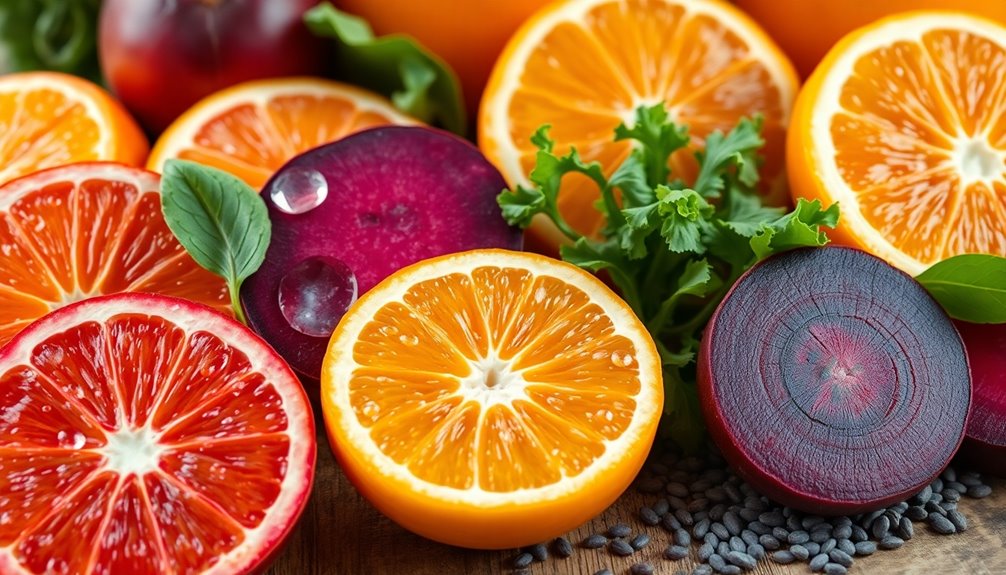Fiber is essential to supporting your body's natural detox processes. It aids digestion by adding bulk to your stool, making it easier for your intestines to eliminate waste. Fiber-rich foods, like oats, beans, and fruits, also nourish beneficial gut bacteria, which produce short-chain fatty acids vital for detoxification. By promoting regular bowel movements, fiber helps the liver and kidneys effectively filter and expel toxins. Plus, it enhances nutrient absorption, stabilizes blood sugar, and contributes to overall well-being. Eating a variety of fiber sources can elevate your health in more ways than one—there's more to discover about its benefits.
Key Takeaways
- Fiber promotes regular bowel movements, aiding in the elimination of toxins and waste from the body.
- Soluble fiber supports liver detoxification by enhancing enzymatic processes that break down toxins.
- A healthy gut microbiome, nourished by fiber, produces short-chain fatty acids that facilitate detoxification.
- Fiber-rich foods improve nutrient absorption and stabilize blood sugar levels, supporting overall health during detox processes.
- Consuming diverse fiber sources, like fruits and whole grains, enhances the body's natural detox functions and promotes gut health.
Understanding Fiber Types
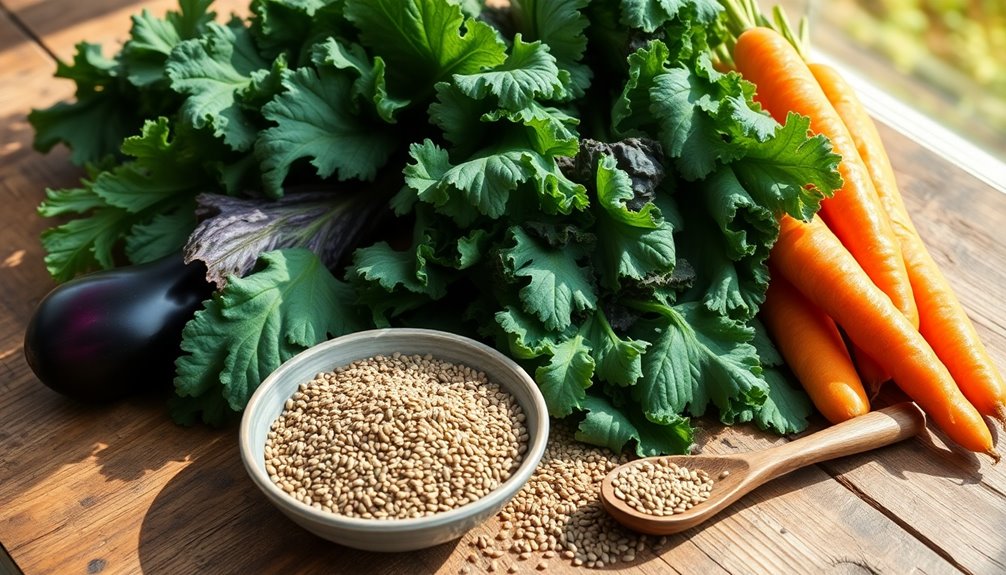
When considering your diet, understanding the different types of fiber is crucial for supporting your body's natural detox processes. Fiber comes in two main types: soluble and insoluble, each offering unique benefits and coming from various fiber sources.
Soluble fiber dissolves in water, forming a gel-like substance. You'll find it in foods like oats, beans, and fruits such as apples and citrus. This type of fiber can help regulate blood sugar levels and lower cholesterol, making it a valuable addition to your diet. It also supports the growth of beneficial gut bacteria, enhancing your overall gut health.
On the other hand, insoluble fiber doesn't dissolve in water. It adds bulk to your stool and helps food move through your digestive system. You can find it in whole grains, nuts, and vegetables like carrots and cauliflower. By promoting regular bowel movements, insoluble fiber plays a crucial role in detoxification, ensuring that waste is efficiently eliminated from your body.
Incorporating a mix of both fiber types into your diet can maximize their benefits. Aim for a variety of fiber sources to enrich your meals and snacks. Not only will this help you feel fuller longer, but it will also support your body's ability to detoxify naturally. Additionally, using tools like mini bands can enhance your overall fitness routine, complementing your healthy eating habits. Embracing these fiber-rich foods creates a sense of belonging to a community that values health and wellness while nurturing your body's essential functions.
Fiber's Impact on Digestion
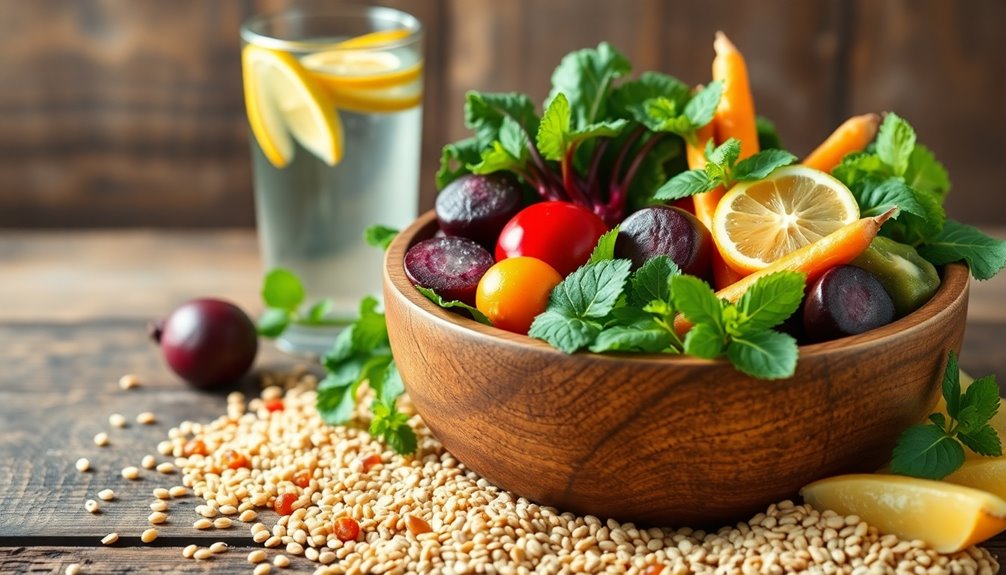
Fiber plays an important role in digestion, acting like a natural broom that sweeps through your intestines. When you include sufficient fiber in your diet, you're not only promoting gut health but also enhancing your body's ability to absorb nutrients effectively.
Soluble fiber, found in foods like oats and beans, dissolves in water to form a gel-like substance. This helps to slow down digestion, allowing your body more time to absorb essential vitamins and minerals from the food you eat.
Conversely, insoluble fiber, present in whole grains and vegetables, adds bulk to your stool and accelerates the passage of food through your digestive tract. This action can prevent constipation and promote regularity, which is important for maintaining a healthy gut environment.
A well-functioning digestive system contributes significantly to overall wellness, as it helps eliminate waste and toxins efficiently.
Moreover, a healthy gut microbiome thrives on fiber. Beneficial bacteria feed on this fiber, producing short-chain fatty acids that further support gut health and reduce inflammation. By fostering a diverse gut microbiome, you're setting the stage for ideal nutrient absorption, which is important for your body's functions.
Incorporating a variety of fiber-rich foods into your meals not only helps you feel full and satisfied but also strengthens your digestive system. Additionally, a plant-based diet, rich in antioxidants and fiber, can significantly enhance your body's natural detox processes. So, make fiber your ally in supporting your body's natural detox processes and enhancing your overall health.
Detoxification Mechanisms in the Body
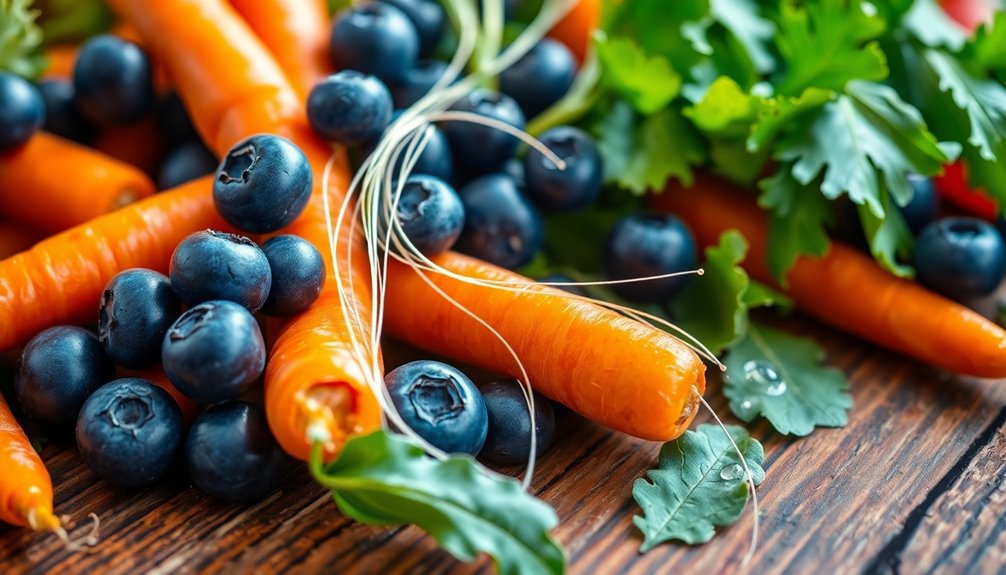
The human body has several intricate detoxification mechanisms that work tirelessly to eliminate harmful substances and maintain overall health. Understanding these processes can empower you to support your body's natural functions better. Here are four key detoxification mechanisms:
- Liver Function: Your liver plays a central role in detoxification, breaking down toxins and drugs through enzymatic processes. It converts harmful substances into less harmful compounds that can be excreted.
- Cellular Detoxification: At the cellular level, your cells have specialized pathways to eliminate waste products. These pathways help neutralize free radicals and remove damaged cellular components, ensuring your cells function optimally.
- Kidney Filtration: Your kidneys filter blood, removing waste and excess substances through urine. This filtration process is essential for maintaining fluid and electrolyte balance in your body.
- Lymphatic System: The lymphatic system transports lymph, which carries away waste products and toxins from tissues. It also plays a role in immune function, helping protect your body from infections. Additionally, incorporating fiber-rich foods into your diet can enhance these detoxification processes by promoting regular bowel movements.
Role of Gut Microbiome
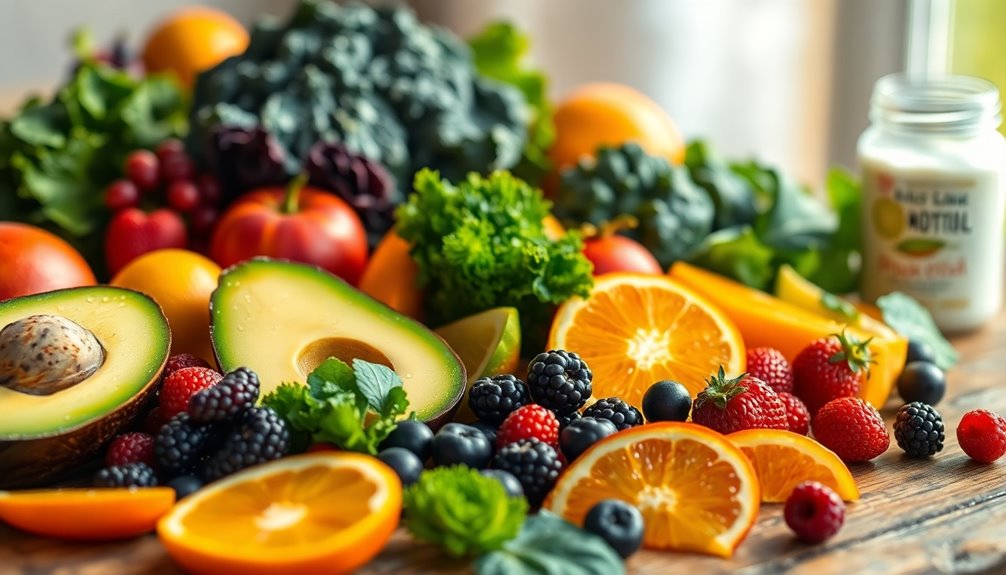
Often disregarded, the gut microbiome plays a vital role in detoxification processes within the body. Your gut is home to trillions of microorganisms that work tirelessly to break down toxins and support your overall health.
The diversity of your microbiome is essential; a varied microbial population enhances your gut health, making it more robust and efficient in detoxifying substances that may harm you.
When you consume food, your gut microbiome helps break down complex compounds, making it easier for your body to eliminate waste. This process also aids in the synthesis of vital vitamins and nutrients that strengthen your immune system, further supporting your detoxification efforts.
A balanced microbiome thrives on fiber-rich foods, which serve as fuel for beneficial bacteria. As these bacteria ferment fiber, they produce short-chain fatty acids that enhance gut health and promote detoxification.
Conversely, a lack of microbiome diversity can lead to dysbiosis, a condition where harmful bacteria outnumber beneficial ones. This imbalance can hinder your body's natural detox processes, making it harder to eliminate toxins effectively.
By prioritizing gut health through a diverse diet, you empower your microbiome to function at its best. Recent independent research has shown that the role of fiber is crucial for optimizing gut health, which in turn supports effective detoxification.
Embracing foods that nourish your gut microbiome not only supports detoxification but also fosters a sense of belonging within the community of individuals aiming for better health. Remember, your choices can greatly influence your gut health and well-being.
Fiber-Rich Foods to Include
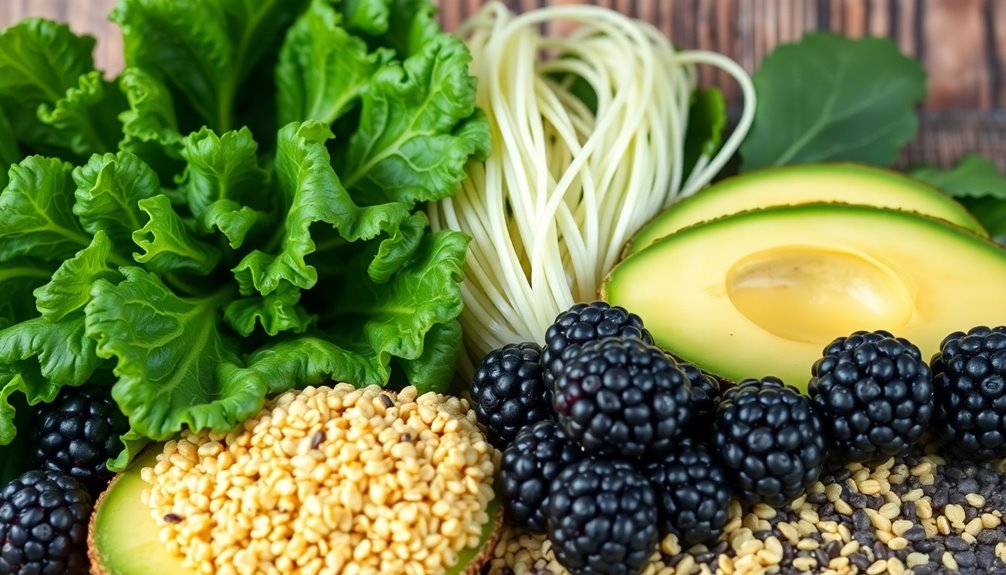
Including a variety of fiber-rich foods in your diet is essential for supporting your gut health and detoxification processes. When you focus on incorporating diverse fiber sources, you not only aid your body's natural detox functions but also create a sense of community around healthy eating. Meal planning becomes easier and more enjoyable when you know what to include.
Here are four fiber-rich foods you should consider:
- Legumes: Beans, lentils, and chickpeas are packed with fiber and protein, making them an excellent addition to soups, salads, and stews. They help maintain stable blood sugar levels and promote a healthy gut microbiome.
- Whole Grains: Opt for whole grains like quinoa, brown rice, and oats. These fiber sources offer essential nutrients and can be easily integrated into your breakfast or as a side dish.
- Fruits: Berries, apples, and pears aren't just delicious; they're also high in fiber. Snacking on these fruits or adding them to your morning smoothie can boost your fiber intake significantly, especially when following a smoothie diet program that emphasizes health benefits.
- Vegetables: Leafy greens like spinach and kale, along with cruciferous veggies like broccoli and Brussels sprouts, are fantastic fiber sources. They can easily be incorporated into your meals as salads, stir-fries, or roasted sides.
Benefits Beyond Detoxification
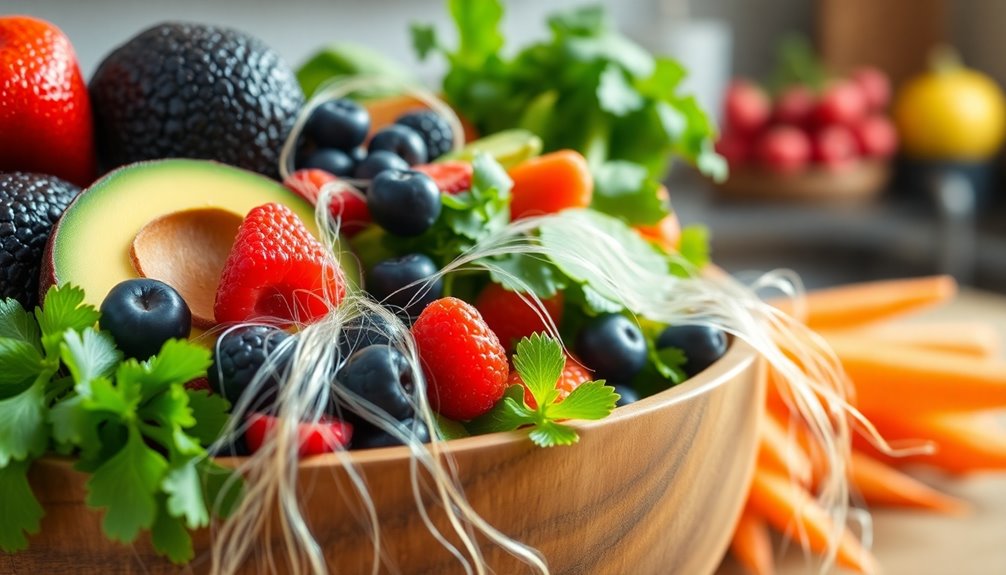
Discovering the benefits of fiber extends far beyond its role in detoxification. One of the most significant advantages you'll experience is improved gut health. When you consume sufficient fiber, it acts as a prebiotic, nourishing the beneficial bacteria in your gut. This balance of gut flora is pivotal for digestion, immunity, and even mental well-being. Studies show that a healthy gut can lead to better absorption of nutrients, which ultimately supports your overall health.
Additionally, fiber can play an essential role in weight management. High-fiber foods tend to be more filling, helping you feel satisfied longer. This can curb cravings and reduce the likelihood of overeating. By including fiber-rich foods in your meals, you're not just enhancing your diet; you're also creating a sustainable approach to maintaining a healthy weight. Research indicates that individuals who consume adequate fiber are less likely to struggle with obesity-related issues.
Moreover, fiber contributes to stable blood sugar levels, which can be particularly beneficial if you're aiming for weight loss or management. It slows down the absorption of sugar, preventing spikes and crashes that can lead to unhealthy snacking. Incorporating fiber into your daily routine isn't just about detox; it's about fostering a healthy, balanced lifestyle that supports your body's needs. By prioritizing gut health and effective weight management through fiber, you're investing in your long-term wellness. Furthermore, the Adaptive Body Boost program emphasizes the importance of nutrition, including fiber, to enhance overall health benefits and support your wellness journey.
Tips for Increasing Fiber Intake
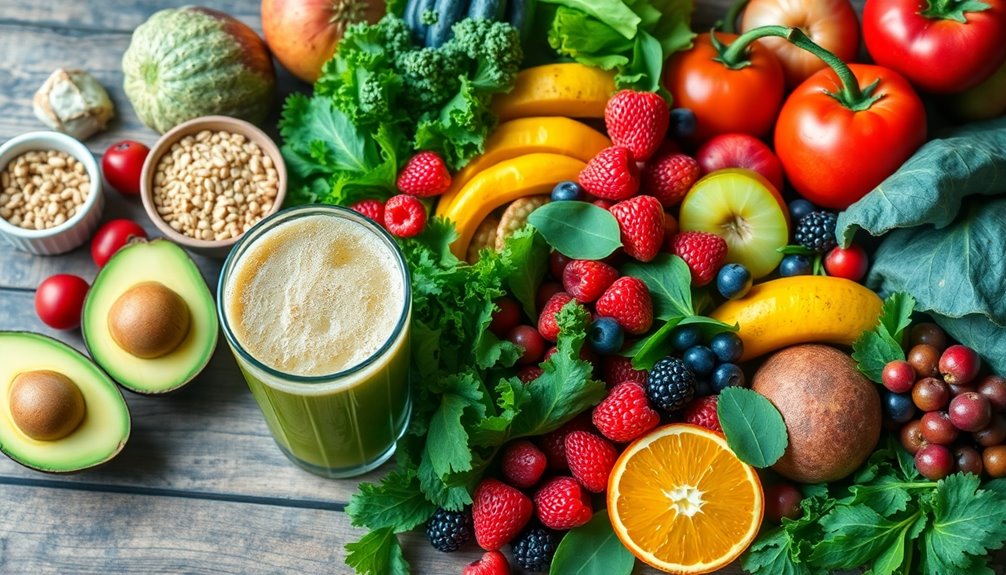
Boosting your fiber intake can be a straightforward and enjoyable process. By making a few simple adjustments to your daily routine, you can easily incorporate more fiber into your meals. Here are four effective tips to get you started:
- Embrace Meal Planning: Take some time each week to plan your meals. Incorporate fiber-rich foods like whole grains, legumes, fruits, and vegetables. By having a clear plan, you'll be more likely to stick to your goals.
- Experiment with Cooking Techniques: Try steaming, roasting, or stir-frying your vegetables to preserve their fiber content while enhancing their flavor. You might discover new favorites that make eating fiber fun!
- Start Your Day with Fiber: Choose a breakfast that includes whole grains, such as oatmeal or whole grain toast. Adding fruits like berries or bananas not only boosts fiber but also adds delicious flavors.
- Snack Wisely: Swap out processed snacks for fiber-rich options. Nuts, seeds, and raw veggies with hummus are great choices that keep you satisfied and support your detox processes. Additionally, incorporating age-old health practices can further enhance your overall well-being and vitality.
Common Myths About Fiber
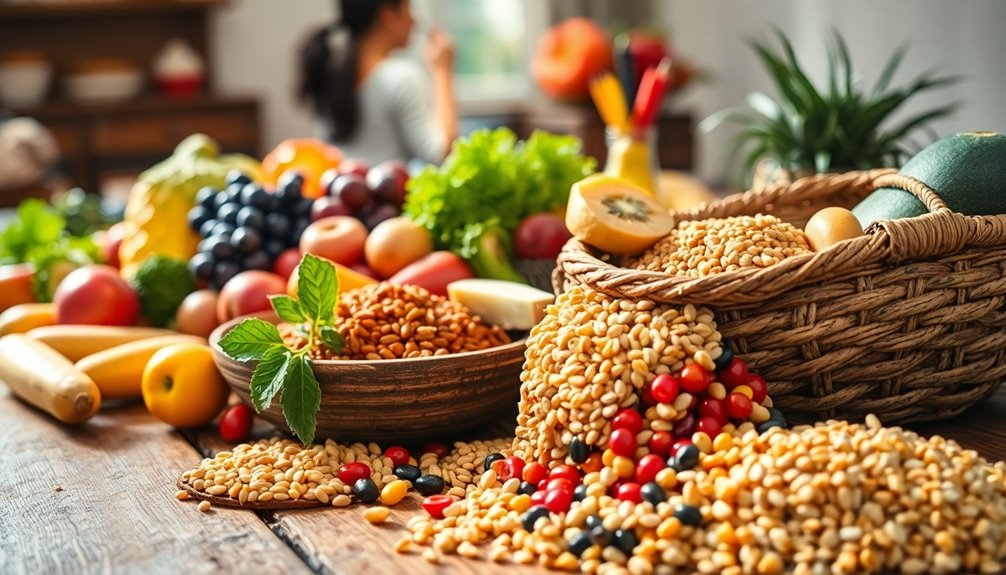
Fiber is often surrounded by misconceptions that can lead to confusion about its role in a healthy diet. One common myth is that all fiber is the same. In reality, there are two types: soluble and insoluble. Soluble fiber, found in oats and beans, helps with cholesterol levels, while insoluble fiber, found in whole grains and vegetables, aids digestion. Understanding these differences is essential to maximizing the health benefits of your fiber intake.
Another misconception is that increasing fiber automatically leads to weight loss. While fiber can help you feel fuller for longer, which may reduce overall calorie consumption, it's not a magic solution. You still need a balanced diet and regular exercise for effective weight management.
Many people also believe that fiber intake only matters if you're constipated. In truth, a consistent fiber-rich diet supports digestive health, regulates blood sugar levels, and may even lower the risk of chronic diseases. By including a variety of fiber sources in your meals, you can enhance your overall well-being. Additionally, high-carb foods like traditional bread can spike blood sugar levels, making fiber's role even more crucial in managing health.
Lastly, some think that fiber supplements can replace whole foods. While supplements can be beneficial, they don't provide the same array of nutrients and benefits that whole foods do. To truly harness the health benefits of fiber, aim to incorporate a diverse range of fruits, vegetables, whole grains, and legumes into your diet. Embracing these truths can help you navigate fiber misconceptions and support your journey toward a healthier lifestyle.
Frequently Asked Questions
How Much Fiber Should I Consume Daily for Detox Support?
To support your detox efforts, aim for a daily fiber intake of 25 to 30 grams, as recommended by health experts. You can find fiber in various sources like fruits, vegetables, whole grains, and legumes. Incorporating these foods not only helps meet your fiber goals but also enhances overall health.
Can Too Much Fiber Cause Digestive Issues?
Imagine you're the proud owner of a fiber-packed salad, convinced you've discovered the secrets of health. But hold on! Too much fiber can lead to digestive discomfort, and not everyone has the same fiber tolerance. If you overdo it, you might find yourself facing bloating or gas.
Balance is key; listen to your body and adjust your intake accordingly. You want to thrive, not become a fiber-fueled balloon!
Is Fiber Effective for Weight Loss or Management?
Yes, fiber's effective for weight loss and management. When you increase your fiber intake, you boost your metabolism and enhance satiety, helping you feel fuller for longer. This means you're less likely to overeat or snack on unhealthy foods. Integrating more fiber-rich foods into your diet can support your weight goals while promoting overall health.
Are There Specific Fibers Better for Detoxification?
When it comes to detoxification, certain fibers can be more beneficial than others. Soluble fibers, like those found in oats and legumes, help absorb toxins and promote elimination.
If you're considering fiber supplements, opt for those derived from plant-based sources, as they can enhance your detox efforts. A plant-based diet rich in fruits, vegetables, and whole grains naturally provides these fibers, supporting your body's ability to cleanse effectively and feel rejuvenated.
Can Fiber Help With Skin Health and Detoxification?
Imagine your gut as a bustling city, where gut microbiota are the hardworking citizens. Fiber acts like a well-maintained road, allowing these citizens to thrive and keep your skin healthy.
When you consume fiber, it helps balance your gut microbiota, enhancing absorption of nutrients and providing antioxidant benefits that fight free radicals.
This vibrant city contributes to detoxification, leading to clearer skin and a more radiant you. Embrace fiber for a healthier glow!
Conclusion
Incorporating fiber into your diet isn't just beneficial; it's like setting free a superhero for your body's detox processes! This mighty nutrient not only fuels digestion but also transforms your gut microbiome into a bustling metropolis of health. By embracing fiber-rich foods, you're not merely supporting detoxification—you're elevating your overall well-being to extraordinary heights! So, seize the power of fiber and watch as your body thrives in ways you never thought possible. Your health deserves nothing less!

